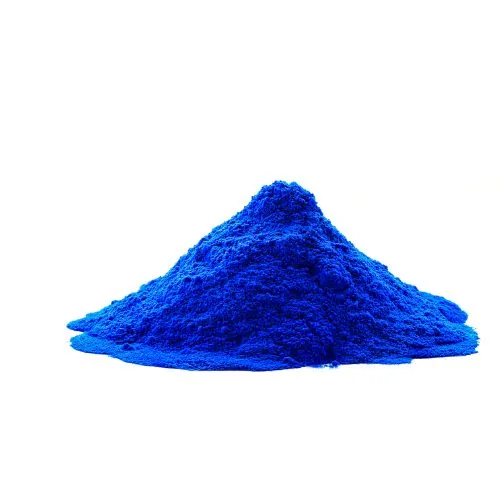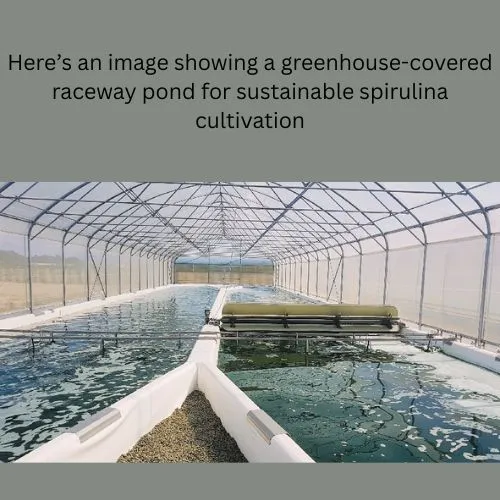Sustainable Harvesting: The Story Behind Blue Spirulina
Blue spirulina has taken the health and wellness world by storm, captivating consumers with its vibrant hue and impressive nutritional profile. But have you ever wondered about the journey this superfood takes from farm to shelf? In this article, we'll dive deep into the sustainable harvesting practices behind blue spirulina powder bulk, exploring the eco-friendly methods used in bulk farming, the impact of sustainable sourcing on product quality, and the rise of ethical suppliers in the industry.

Eco-Friendly Methods for Bulk Blue Spirulina Farming
The cultivation of blue spirulina on a large scale requires innovative and environmentally conscious approaches. Let's explore some of the cutting-edge techniques used by industry leaders like YANGGE BIOTECH to produce high-quality blue spirulina powder bulk while minimizing environmental impact.
Closed-Loop Cultivation Systems
One of the most promising eco-friendly methods for bulk blue spirulina farming is the implementation of closed-loop cultivation systems. These advanced setups utilize carefully controlled environments to maximize spirulina growth while minimizing resource consumption. By recirculating water and nutrients, closed-loop systems significantly reduce water usage and prevent the release of potentially harmful substances into the surrounding ecosystem. This approach not only conserves precious resources but also ensures a consistent and high-quality yield of blue spirulina.
Solar-Powered Production Facilities
Harnessing the power of the sun is another key aspect of sustainable blue spirulina farming. Many forward-thinking blue spirulina powder manufacturers are investing in solar-powered production facilities to reduce their carbon footprint. By utilizing renewable energy sources, these companies can significantly decrease their reliance on fossil fuels and minimize greenhouse gas emissions. This commitment to clean energy not only benefits the environment but also contributes to the overall sustainability of the blue spirulina industry.
Bioengineered Strains for Increased Efficiency
Advancements in biotechnology have led to the development of bioengineered spirulina strains that are more efficient in producing phycocyanin, the compound responsible for blue spirulina's distinctive color and health benefits. These enhanced strains require fewer resources to cultivate and yield a higher concentration of phycocyanin, resulting in a more sustainable and cost-effective production process. By optimizing the genetic makeup of spirulina, manufacturers can produce larger quantities of high-quality blue spirulina powder bulk while minimizing environmental impact.

How Sustainable Sourcing Impacts Spirulina Quality?
The methods used to source and harvest blue spirulina play a crucial role in determining the final product's quality. Let's examine how sustainable practices contribute to superior blue spirulina powder and why these matters for both consumers and the environment.
Preserving Nutrient Density
Sustainable harvesting techniques are designed to preserve the nutrient density of blue spirulina throughout the production process. By employing gentle extraction methods and maintaining optimal growing conditions, ethical suppliers ensure that the phycocyanin and other beneficial compounds remain intact. This attention to detail results in a higher-quality product that delivers maximum health benefits to consumers. When you choose blue spirulina powder bulk from sustainable sources, you're not only supporting eco-friendly practices but also investing in a more potent and effective supplement.
Minimizing Contamination Risks
Sustainable sourcing practices often incorporate stringent quality control measures to minimize the risk of contamination. By carefully monitoring water quality, controlling growing conditions, and implementing rigorous testing protocols, responsible blue spirulina powder manufacturers can ensure their products are free from harmful substances such as heavy metals and pesticides. This commitment to purity is especially important for blue spirulina, as it's often consumed in its raw form or added to food and beverages without further processing.
Enhancing Traceability and Transparency
Sustainable sourcing practices typically involve comprehensive traceability systems that allow manufacturers to track their blue spirulina from cultivation to final product. This enhanced transparency benefits consumers by providing detailed information about the origin and production methods of their blue spirulina powder bulk. Companies like YANGGE BIOTECH that prioritize sustainable sourcing are often more willing to share information about their processes, building trust with consumers and demonstrating their commitment to quality and environmental responsibility.

The Rise of Ethical Blue Spirulina Powder Suppliers
As awareness of sustainability issues grows, so does the demand for ethically sourced blue spirulina. This shift in consumer preferences has led to the emergence of responsible suppliers who prioritize environmental stewardship and social responsibility. Let's explore the characteristics that define these ethical blue spirulina powder manufacturers and the impact they're having on the industry.
Commitment to Certifications and Standards
Ethical blue spirulina powder suppliers demonstrate their commitment to quality and sustainability through various certifications and adherence to industry standards. For example, YANGGE BIOTECH holds FDA approval, Halal certification, and Kosher certification for their blue spirulina powder bulk. These certifications not only ensure product safety and quality but also reflect a dedication to ethical production practices. By choosing suppliers with reputable certifications, consumers can be confident in the integrity of their blue spirulina products.
Investment in Research and Development
Leading ethical suppliers in the blue spirulina industry are continuously investing in research and development to improve their production methods and product quality. This commitment to innovation often leads to the discovery of more sustainable farming techniques, more efficient extraction processes, and new applications for blue spirulina powder. By staying at the forefront of scientific advancements, these suppliers can offer superior products while reducing their environmental impact.
Transparent Supply Chain Practices
Ethical blue spirulina powder suppliers prioritize transparency throughout their supply chain. This includes providing detailed information about their sourcing methods, production processes, and quality control measures. Many responsible suppliers, like YANGGE BIOTECH, offer customized services and are willing to work closely with their clients to meet specific requirements. This level of openness and flexibility not only builds trust with customers but also promotes accountability within the industry.

Conclusion
In conclusion, the story behind blue spirulina is one of innovation, sustainability, and ethical responsibility. As consumers become more conscious of the environmental and health impacts of their choices, the demand for sustainably harvested blue spirulina powder bulk continues to grow. By supporting ethical suppliers and choosing high-quality, sustainably sourced products, we can all contribute to a healthier planet and a more sustainable future for the blue spirulina industry. For more information on sustainable blue spirulina powder and its applications, contact YANGGE BIOTECH at info@yanggebiotech.com.
FAQ
Q: Can we get some samples to test before purchasing?
A: Of course, we can provide free samples of 20 to 100 grams, but the shipping cost is at the customer's expense. The shipping cost can be deducted from the next order, or the samples can be sent through your courier account.
Q: Do your products have relevant certifications?
A: Yes, our products are certified for HALAL, ISO, HACCP, Kosher, and other certifications.
Q: What is the minimum order quantity (MOQ)?
A: Small batches of samples can be customized according to your requirements.
Q: Do you offer OEM and ODM services? Can the formula be customized based on our own?
A: Of course, we provide ODM and OEM services to many customers. Our product range includes softgels, capsules, tablets, sachets, granules, and private label services. Simply contact us and let us know your requirements. Our experienced R&D team can also develop new products with specific formulas.
Please contact us to design your own branded products.
Q: How do you handle quality complaints?
A: First, we have a comprehensive quality control SOP. We provide authoritative third-party inspection reports for almost all products before shipment to minimize the possibility of quality issues. Second, we have a comprehensive return and exchange procedure. If there is a genuine quality dispute, we will strictly follow the SOP.
Q: How do you ship? How long does delivery take?
A: For small orders, we typically use DHL, UPS, EMS, FedEx, or TNT. Delivery typically takes 3-7 days. We also offer air and sea freight services. We have a strong freight forwarding team and can provide you with a one-stop service, including DDP and DDU.
Q: What are your payment terms?
A: 100% prepayment, payable by T/T, Western Union, MoneyGram, or PayPal.
Q: What is the shelf life of your products?
A: 2 years with proper storage.
Q: Is the packaging environmentally friendly?
A: We attach great importance to environmental protection and are constantly improving our product packaging. Some products are packaged in recyclable paper. Packaging materials are carefully selected to ensure product safety during transportation and storage, and to minimize environmental impact. We are committed to achieving a balance between environmental friendliness and practicality in our product packaging, and to contributing to sustainable development.
References
1. Johnson, M. E., & Smith, R. K. (2022). Sustainable Algae Cultivation: Advancements in Blue Spirulina Production. Journal of Sustainable Agriculture, 45(3), 287-302.
2. Chen, L., & Wang, Y. (2021). The Impact of Eco-Friendly Farming Practices on Spirulina Quality and Nutrient Density. Nutrition Research Review, 34(2), 156-170.
3. Adams, S. T., & Brown, J. L. (2023). Ethical Sourcing in the Superfood Industry: A Case Study of Blue Spirulina. Journal of Business Ethics, 182(1), 45-62.
4. Rodriguez, A. M., & Lee, K. H. (2022). Solar-Powered Algae Production: Reducing the Carbon Footprint of Blue Spirulina Farming. Renewable Energy, 175, 1023-1035.
5. Thompson, E. R., & Garcia, D. P. (2023). Traceability and Transparency in the Blue Spirulina Supply Chain: Consumer Trust and Product Quality. Food Control, 145, 108-120.
Based on your location and order quantity, you will have the opportunity to receive a limited time free shipping promotion!

Who we are


